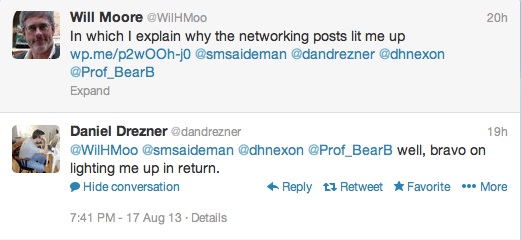After tossing out a brief opinion on the value of networking at conferences like APSA (nutshell: say smart things, don’t worry about networking per se), I was surprised to find that I’d become part of a controversy on the subject. Will Moore both indulges his considerable intellectual curiosity—
I invite Professors Saideman, Drezner, Voeten, and Braumoeller to make arguments about why a belief that (1) the distribution over these things is uniform, or (2) that the value is unlikely correlated across supply and demand is superior to my belief that they are varied. I have often found, upon reflection, that my beliefs are poor, and will do my best to update, provided compelling reasons to so.
—and vents his spleen—
Here I will snark: can you mainsplain that to me, because I surely won’t be able to figure that out on my own. Yeah, you fuktup.
—in an extended post on his blog.
I’m happy to respond. I probably shouldn’t do so just yet, since Dan Drezner already showed some interest in the exchange:
Since Dan blogs professionally, and he usually has insightful responses to questions like this, and it looks like he’s pretty motivated, my best option would probably be to get back to working on my syllabi, wait until Dan posts something, and chime in with, “Yeah, what Dan said!” But the time and effort that Will put into elucidating his position deserve a reply in kind.
Will’s main point is that, along with others, my post is “guilty, at a very high level of generality, of … (implicitly) believing that advice drawn from your experience is universally valuable.” That belief, he argues, is not unrelated to the fact that I’m a tenured white male with a degree from a top department.
Without getting into the impact of tenure, race, sex, or locus of degree on self-centeredness—I don’t study them, and I don’t presume to be an expert—I’ll point out a few things that suggest a different interpretation of my remarks.
- They start with the words “My two cents.” That’s one way in which authors generally indicate that their perspective may not be generalizable or universally valid.
- They were a private post on my Facebook page rather than a public post on my blog. I do have a blog. I don’t use it much, nor do I send in many submissions to blogs like the Monkey Cage, though I have sent in one or two. That’s because I think our discipline is most credible when we keep our powder dry and only opine publicly when we’ve put in enough hard work to make our opinions worth reading.
- Even when I do blog, I invariably use the words “I think…” or “My sense is…” to indicate that I’m offering my own perspective, not presuming to offer a universally valid one.
I address this point largely because it’s the one that seemed to upset Will the most. Will’s and my relationship falls into a category that probably seems odd to most people but very familiar to academics: we get along pleasantly enough, I’d enjoy seeing him arrive at my table at the conference-hotel bar, but neither of us has been to the other’s house or anything of the sort. I don’t think English has a very good word for that sort of relationship, really, but the upshot is, I like the guy enough not to want to upset him unnecessarily.
I don’t think the point is really relevant to the discussion of networking, though, because on that point, I think we’re simply talking past each other. As I pointed out in a comment to that same Facebook post—a response to Will, in fact—, I was discussing the value of networking at APSA, not the value of having a professional network.
I’ll elaborate. In my experience, when graduate students talk about “networking” at big conferences like APSA, they’re talking about meeting fairly senior and well-known people for the sake of meeting them. My own sense is that there isn’t much value to that practice. Despite being skeptical, I did try it myself once as a graduate student. The response reminded me of stories I’d read about Lyndon B. Johnson. I never tried it again. As a professor, I’ve spent some very pleasant social hours at conferences with various graduate students, but those evenings don’t really have any weight when it comes to hiring decisions and the like.
That’s not to say that people can’t form useful connections at conferences. But any time I’ve noticed someone, or feel as though I’ve been noticed, it hasn’t been through conscious effort. It’s been the result of a really smart comment, discussion, or presentation. And it’s not to say that networking via other means isn’t valuable: I think conferences like Journeys in World Politics do a terrific job of helping people make connections to more senior scholars who can advise them on their work and their careers.
(As a quick aside, Steve Saideman used “networking” in his response to Will in a way that I hadn’t considered—peer-to-peer networking, or networking with other junior scholars. I actually think there’s immense value in that practice. I just hadn’t considered it.)
So with all this in mind, when I re-read the passage in which Will writes, “my claim is that neither the value of the network itself, nor the potential return from a given unit of networking activity, are uniform,” I’m not sure we actually disagree at all. I don’t think networks are equally valuable across scholars. I don’t think the potential return from network-building is the same for different people. I do think the best return, at conferences like APSA, comes from saying smart things… but as I wrote earlier, that’s just my two cents.


